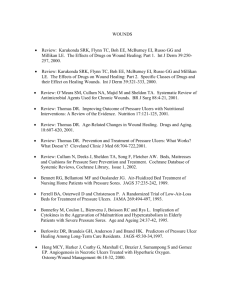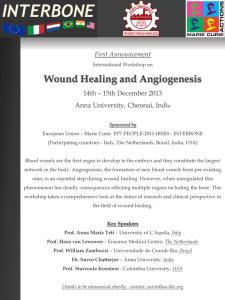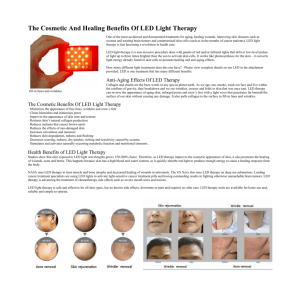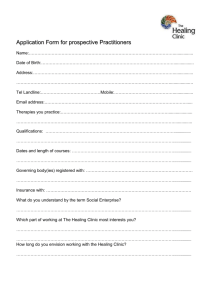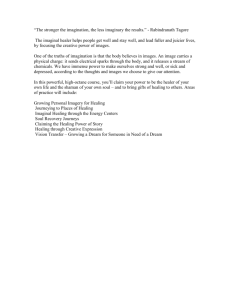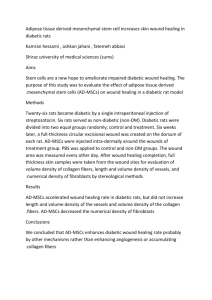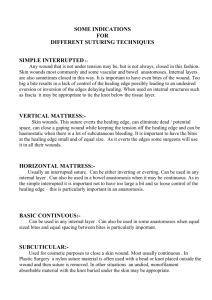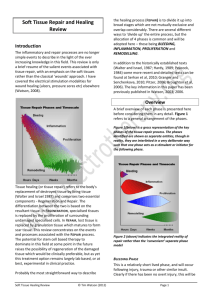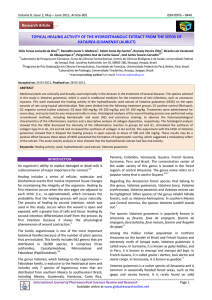Chapter 6 Handout
advertisement
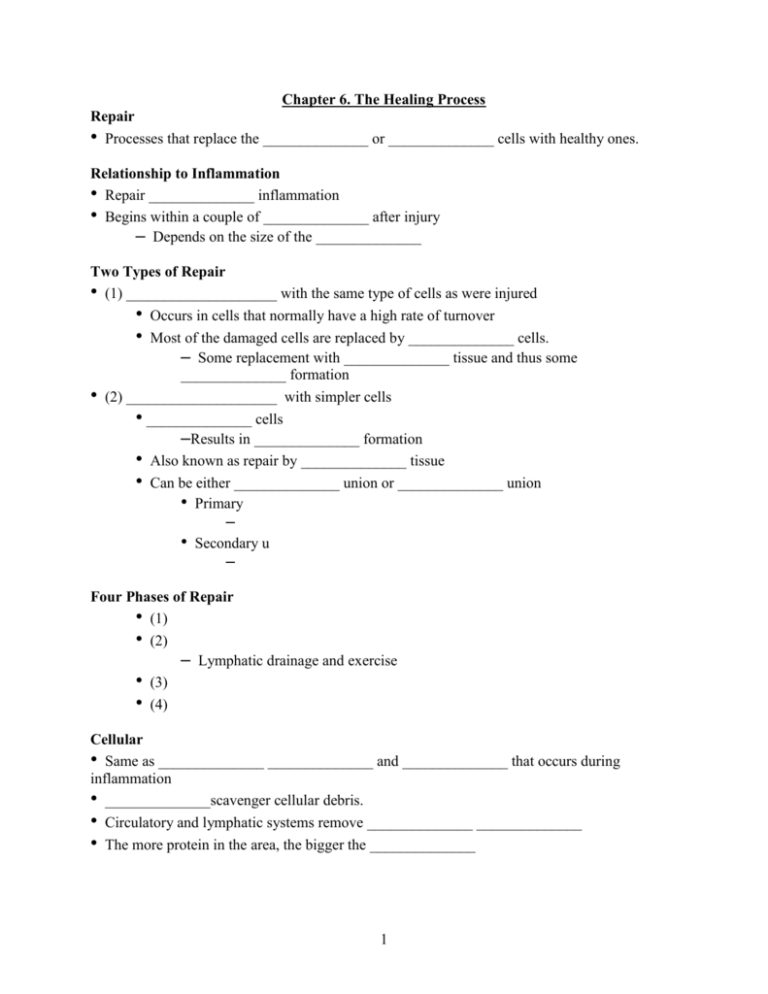
Chapter 6. The Healing Process Repair • Processes that replace the ______________ or ______________ cells with healthy ones. Relationship to Inflammation • Repair ______________ inflammation • Begins within a couple of ______________ after injury – Depends on the size of the ______________ Two Types of Repair • (1) ____________________ with the same type of cells as were injured • Occurs in cells that normally have a high rate of turnover • Most of the damaged cells are replaced by ______________ cells. – Some replacement with ______________ tissue and thus some ______________ formation • (2) ____________________ with simpler cells • ______________ cells –Results in ______________ formation • Also known as repair by ______________ tissue • Can be either ______________ union or ______________ union • Primary – • Secondary u – Four Phases of Repair • (1) • (2) – Lymphatic drainage and exercise • (3) • (4) Cellular • Same as ______________ ______________ and ______________ that occurs during inflammation • ______________scavenger cellular debris. • Circulatory and lymphatic systems remove ______________ ______________ • The more protein in the area, the bigger the ______________ 1 Lymphatic Drainage and Exercise • • Depends on ______________ ______________ to promote fluid movement • ______________ squeezes the lymphatic vessels and forces contents toward the ______________ system. • Massage and intermittent compression pumps promote______________ ______________ Vascular • ______________ phase during which new vessels are formed • Transient because ______________ vessels eventually ______________ • New vessels are necessary to deliver ______________ and ______________ to the wound for repair • New vessels are formed via ______________ ______________ • ______________ cells of existing vessels at the ______________ of wound begin to ______________ • New cells crawl away but keep contact with the ______________ vessel • Adjacent ______________ ______________ migrate toward one another, meet, unite, and create a ______________ ______________ • Arches form a ______________, or a capillary ______________ • Blood then begins to flow through, causing new budding. – Gives free circulation to the wound area to support ______________ Collagenization • ______________ and ______________ down collagen in the wound space • Collagen is the principle solid substance of ______________, ______________, and ______________ ______________ • ______________ manufacture strands of collagen, then extrude it into the wound space. • Most collagen is laid down within ____–____ days after the injury. • Wound is not very strong yet due to ______________ ______________ • Collagen will realign ______________ to the lines of force. • Realignment sometimes takes up to a ______________ – May be longer if patient is ______________ • • Requires great amounts of ______________ • Oxygen provides ______________ • Oxygen is the building block of ______________ Healing wounds normally do not have all of the oxygen that they could use. • ______________ accumulated in the damaged tissue and the tensile strength of skin wounds linearly related to ______________ availability • ↑ oxygen = 2 Contraction and Restructuring Process by which ______________ ______________ becomes smaller and paler Contraction occurs ______________ • Capillary arcade ______________ • Collagen is relatively ______________ tissue. • Doesn’t need much ______________; therefore, doesn’t need much circulation • Collagen ______________ occurs next • Collagen fibers ______________ from haphazard to ______________ arrangement. • Compacts scar • Fiber reorganization gives the scar greater ______________ • Fibers running ______________ to the lines of force will not help keep the edges of the wound together. • Fibers running ______________ to the lines of force ______________ the injured tissue. • Active exercise is necessary during final phase of wound healing. Exercise and Healing • Stimulates ______________, thus increases ______________ delivery to healing tissue • Provides ______________ lines that are ______________ as a guide to restructuring collagen – Too ______________ will ______________ the healing tissue – Too ______________ will not provide adequate o ______________ or ______________ for normal healing Healing Modifiers *** Goal: To help the healing process. *** • Immediate care procedures – The ______________ the hematoma, the quicker the repair • Close lacerations immediately. – • • Use suture or Steri-Strips to close the wound gap. For best results: – ASAP, but within 4–6 hr after injury Therapeutic Exercise • Facilitate or hinder healing? – Brings more ______________ to the wound sites – Guides fiber ______________ during restructuring – ______________ exercise will tear the healing tissue and thus ______________ healing. 3 Therapeutic Modalities • Stimulate healing: • Promote lymphatic drainage: • Modulate pain, thus facilitating therapeutic exercise: Proper Nutrition • Many vitamins and trace elements are essential to healing. • No evidence that extra facilitates healing. • Lack of them, however, will hinder healing. 4
